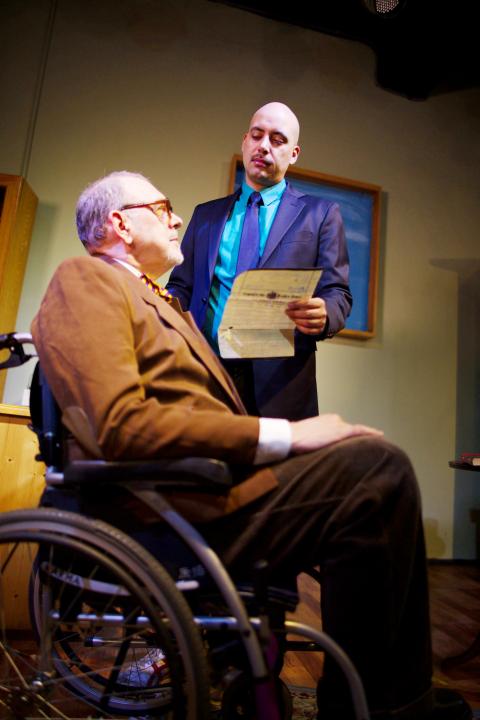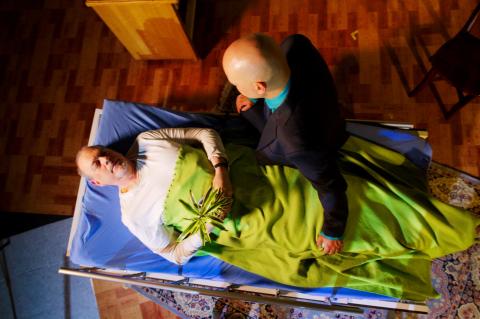Taiwan gained insight into the Latin aphorism ars longa, vita brevis (art is long, life is short) with LAB Space’s recent production of Tuesdays with Morrie. Directed by Taiwan-based impresario Brook Hall, the play, like the well-known memoir of the same name, treats the relationship of sports writer Mitch Albom and his former professor Morrie Schwartz as the latter faces death. Taiwan, however, got more than just a play in that process; it got an intriguing look into the symbiotic relationships that exist between art, life and serendipity.
Start with the book and biography. Certainly, no one will deny how autobiographical and biographical elements can run through art and fiction. Many of Hemingway’s novels, for example, draw both upon his and the life experiences of his friends for background.
The play differs from the book. In drama, since each production varies in director and cast, the impact will also be different. Taiwan’s production of the play had this one extra feature — Rob Schwartz, the son of Morrie Schwartz, attended performances in the last week and stayed to answer audience questions, biographical and otherwise.

Photo courtesy of Tobie Openshaw
Intermixed is serendipity. Rob Schwartz made a point of using that word in one of his answers. Working in Tokyo as Bureau Chief of Billboard Magazine, he learned of Taiwan’s production via a Facebook posting and volunteered to visit. Serendipity played a big part in the writing of the book as well. If Mitch Albom had not been channel surfing at the time he would not have learned of the debilitating condition of Morrie from Ted Koppel’s Nightline. He would also probably not have had the time for the 14 Tuesday visits with Morrie before his death except that Albom’s paper was on strike freeing up his schedule.
For his part, Hall says he was influenced by the book and wanted LAB Space to be known for more than comedies. He also had the constraints of the small theater space requiring plays with a minimal cast and he had in mind a well-known entertainer, DC Rapier, to fit the lead role. Rapier read the book and was moved by both it and the play, but the lines of the play perhaps had more impact since a friend of his had just died and Rapier himself had had a somewhat life-threatening operation. Victor Stevenson, who played Mitch, used the illness and death of his own father to help identify with his role. He and Rapier developed the needed chemistry for the play.
Rob Schwartz brought other elements in. What was it like growing up with his father? How did the family feel about Mitch? When the Schwartz family sold the house made famous by the book, his mother refused to let that be part of the advertisement, though it would have increased the value. A best seller? Several publishers had originally refused the book; it did not take off until Oprah endorsed it. Did that make it art or more what the general public wanted or both? Some people might have liked the book less if they knew of the left wing politics of Rob’s father. That element was purposely left out. And of course there were unrelated questions like, what do you feel about Doraemon?

Photo courtesy of Tobie Openshaw
The book allows for pauses and rereading; the play is bounded by a brief time span for digestion but it is live. Those who had read the memoir could make their own judgments. Rob Schwartz obviously preferred the book; it dealt with his father’s life and thought. This writer preferred the play, perhaps because the drama made the learning and change in Albom’s writing direction more poignant. Having read the book nearly a decade ago, the only specific remembrance is how Albom symbolically brought food that Morrie Schwartz could no longer eat.
Morrie Schwartz died before Albom’s book on his final “class” hit bookshelves; he would never know the full reach of the work and certainly could not have envisioned the play being shown in Taiwan. Life, reality, art, serendipity and memoir; it is all here and the LAB Space as community theater is part of it. For future projects by LAB Space, go to www.facebook.com/labspacetw.

Photos courtesy of Tobie Openshaw

On April 26, The Lancet published a letter from two doctors at Taichung-based China Medical University Hospital (CMUH) warning that “Taiwan’s Health Care System is on the Brink of Collapse.” The authors said that “Years of policy inaction and mismanagement of resources have led to the National Health Insurance system operating under unsustainable conditions.” The pushback was immediate. Errors in the paper were quickly identified and publicized, to discredit the authors (the hospital apologized). CNA reported that CMUH said the letter described Taiwan in 2021 as having 62 nurses per 10,000 people, when the correct number was 78 nurses per 10,000

As we live longer, our risk of cognitive impairment is increasing. How can we delay the onset of symptoms? Do we have to give up every indulgence or can small changes make a difference? We asked neurologists for tips on how to keep our brains healthy for life. TAKE CARE OF YOUR HEALTH “All of the sensible things that apply to bodily health apply to brain health,” says Suzanne O’Sullivan, a consultant in neurology at the National Hospital for Neurology and Neurosurgery in London, and the author of The Age of Diagnosis. “When you’re 20, you can get away with absolute

May 5 to May 11 What started out as friction between Taiwanese students at Taichung First High School and a Japanese head cook escalated dramatically over the first two weeks of May 1927. It began on April 30 when the cook’s wife knew that lotus starch used in that night’s dinner had rat feces in it, but failed to inform staff until the meal was already prepared. The students believed that her silence was intentional, and filed a complaint. The school’s Japanese administrators sided with the cook’s family, dismissing the students as troublemakers and clamping down on their freedoms — with

As Donald Trump’s executive order in March led to the shuttering of Voice of America (VOA) — the global broadcaster whose roots date back to the fight against Nazi propaganda — he quickly attracted support from figures not used to aligning themselves with any US administration. Trump had ordered the US Agency for Global Media, the federal agency that funds VOA and other groups promoting independent journalism overseas, to be “eliminated to the maximum extent consistent with applicable law.” The decision suddenly halted programming in 49 languages to more than 425 million people. In Moscow, Margarita Simonyan, the hardline editor-in-chief of the